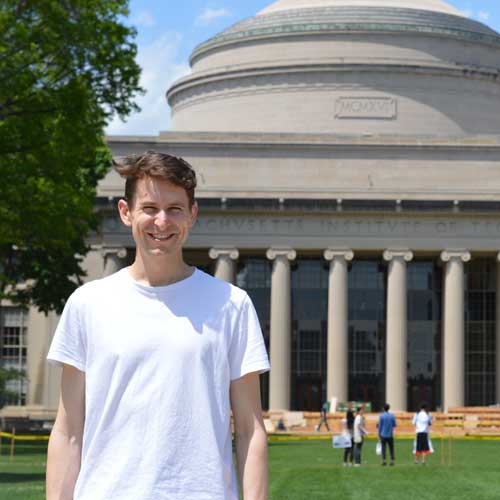Alumni Profile: Paul Worgan
What I'm doing now and how the CDT experience has helped my career
I am currently a postdoctoral research associate at the Massachusetts Institute of Technology Computer Science and Artificial Intelligence Laboratory. I am continuing my research into providing energy to mobile computing devices and considering how to provide energy to shape changing mobile computers. Living abroad from your family and friends brings its own challenges, however I feel I developed both personally and professionally on the CDT in Communications, and I am enjoying my research at MIT and life in Boston.
Why I chose the CDT route and what I gained from being part of the CDT
I joined the CDT in Communications after completing an MSc in Computer Science at the University of Bristol and a BSc in Physics at the University of Exeter. A large factor in my decision to study with the CDT in Communications was the taught year and the ability to develop a research question whilst studying. For me, choosing a research topic seemed a daunting prospect. However, my PhD supervisor and I had many discussions and were able to develop a research question which I found exciting and felt passionate to work on for three years.
PhD project topic
My PhD was titled 'Inductive energy transfer systems for mobile and wearable computing' and considered how we could autonomously provide energy to the body to support a variety of on-body mobile computers, instead of user initiated charging. To achieve automatic charging of devices we considered inductive power transfer, similar to the technology used to recharge electric toothbrushes. The project considered the physics, engineering, human factors and compliance of the systems with international guidelines in equal measure.
Autonomous charging of wearables becomes particularly important in the context of providing energy to healthcare devices, where devices see high levels of abandonment. We seem willing to invest time and effort in charging our smartphones, as they are a multi-modal communication tool, enabling us to keep in touch with our friends and family. However, for single use health data devices, potentially without a display, the shift in the perceived worth of the device appears to cause us to stop recharging them. Thus a new form of autonomous device recharging is necessary.
I feel very lucky to have presented research papers internationally in locations including Seoul, Istanbul, Milan and San Francisco. Connecting with the community at conferences is an important step in getting feedback on your research ideas. I was also very pleased when the Economist wrote an article titled 'Buddy, can you spare a watt?' on my research into collaborative mobile energy distribution.
How the CDT training/secondments benefitted my PhD research
The CDT in Communications helped me to understand my research from both an academic and industrial point of view. Many research projects have commercial value but this can be easily overlooked when concentrating on submitting the next paper. The CDT taught courses helped me understand the symbiosis of research and industrial ideas. Furthermore, I believe I developed confidence throughout my PhD by undertaking the presentation and public speaking training offered by the CDT.
Five to ten year plan
I am currently a Senior Research Fellow at the Centre for Print Research (CFPR) at the University of the West of England (UWE). I joined UWE in 2019, as a Research Fellow in Healthcare Technology at the Health Technology Hub and got to experience being an engineer within a biosciences environment; I enjoyed the interdisciplinary research environment for similar reasons I enjoyed the interdisciplinary nature of the CDT in Communications.
I joined CFPR in August 2021 and I am now combining the knowledge I gained through my PhD with the CDT in Communications in inductive power transfer with healthcare technology to research the next generation of ingestible sensors; or gathering diagnostics from directly within the patient.

"I thoroughly enjoyed my time as a PhD student on the CDT in Communications. Being part of a cohort helped motivate me through the difficult times and I believe made the good times even sweeter."